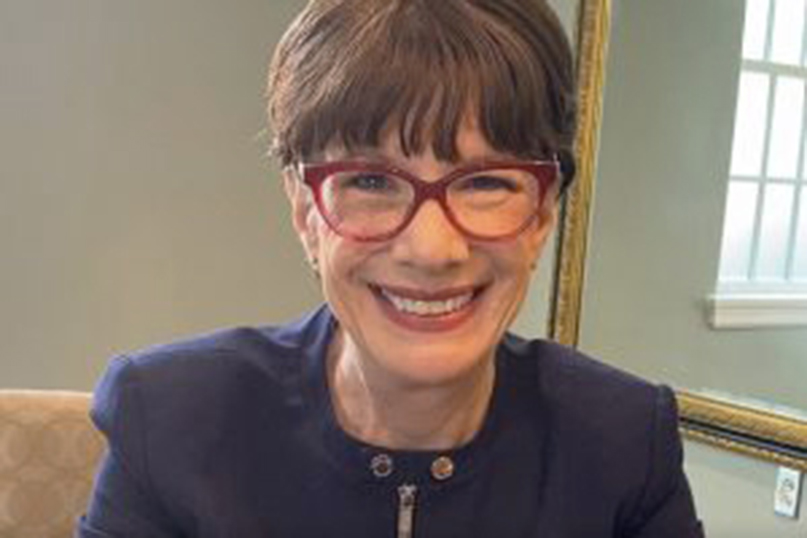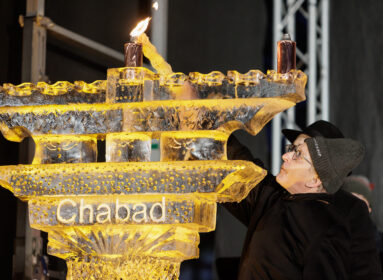
By Stacey Dresner
HARTFORD – Dr. Amy-Jill Levine, a foremost scholar in the study of Judaism, the Tanakh (Jewish scriptures), and the New Testament has been named the Rabbi Stanley M. Kessler Distinguished Professor of New Testament and Jewish Studies at The Hartford Seminary. The first person to fill this post, Levine arrives from Vanderbilt University in Nashville, Tenn., where she is professor of New Testament and Jewish Studies Emerita and Mary Jane Werthan Professor of Jewish Studies Emerita.
Hartford Seminary’s new distinguished professorship is named after Rabbi Stanley M. Kessler z”l, who served as rabbi of Beth El Temple in West Hartford for 38 years. Kessler, who died in 2019, also served on The Hartford Seminary’s board of trustees from 1994 to 1997, and was a civil rights advocate who marched with Dr. Martin Luther King, Jr. during the 1960s. This position is made possible through the support of numerous donors, including a lead gift from Abigail Kessler-Hanna, M.D., Rabbi Kessler’s daughter.
Raised in a predominantly Catholic neighborhood in North Dartmouth, Mass., Levine, a scholar of Christian-Jewish relations, early Christianity, and feminist biblical interpretation, has described herself as a “Yankee Jewish feminist who teaches in a Christian divinity school in the buckle of the Bible Belt.”
In 2019, she became the first Jew to teach a New Testament course at the Pontifical Biblical Institute in Rome. In 2021, she was elected to membership in the American Academy of Arts and Sciences.
She will reside in Hartford each year during the late spring for a summer session course and will teach, give public lectures, engage in talks and presentations at local places of worship. An inaugural public lecture will take place at Beth El Temple in the spring of 2022 to recognize her appointment and honor Rabbi Kessler’s legacy.
“If ever there was a ‘rock star’ in this realm, Professor Levine is it. To name her professorship in honor of Rabbi Kessler is a double blessing,” said Joel N. Lohr, president of the seminary.
Levine has published more than 30 books including The Misunderstood Jew, Short Stories by Jesus, five children’s books and The Bible With and Without Jesus, with Marc Z. Brettler. With Brettler, she also edited the Jewish Annotated New Testament.
She recently spoke to the Jewish Ledger about her work and what inspired her, as a Jew, to become a scholar specializing in Christianity and the New Testament.
JEWISH LEDGER: Tell us about your Jewish upbringing.
AMY-JILL LEVINE: I grew up as a member of Tifereth Israel, a Conservative synagogue in New Bedford. If I am remembering correctly, my maternal grandmother was the sisterhood’s first president and my maternal grandfather the congregation’s second president. I attended Hebrew school two days a week, Friday night services, junior congregation on Saturday morning until becoming bat mitzvah and regular Shabbos services after that, and Sunday school.
We did not keep kosher. My father, who was in the scallop business, insisted that we celebrate Shabbos with the best food available. Generally, that meant lobster. However, on Friday night, my mother would put down her knitting needles and my grandmother would put down her crochet hook; they’d start again to knit and crochet on Saturday evening.
What sparked your interest in Jesus and the New Testament?
Growing up in a predominantly Roman Catholic neighborhood in North Dartmouth, Mass., I knew well the beauty of churches inside and out; I enjoyed going to the Feast of the Blessed Sacrament in New Bedford, and I loved the Christmas carols we sang in elementary school. My parents told me that Christianity was much like Judaism: we worshiped the same God, the one who created the heavens and the earth; we prayed the same prayers, most notably the Psalms; and a Jewish man named Jesus was very important to Christians. Thus, my initial sense was that Christianity was much like Judaism and the church was like the synagogue we did not attend.
Living in such a predominantly Catholic neighborhood, did you experience any antisemitism?
Despite numerous positive connections my parents drew between the Jewish and Christian traditions, I learned very quickly that all was not irenic. When I was in second grade, a girl on the school bus accused me of killing her lord. Since I was certain I did not kill anyone, I told her she was wrong. She insisted, “Our priest said so.” Now comes my first lesson in inter-religious relations: the importance of asking rather than presuming. I presumed that the special collars priests wore magically prevented lying. Thinking that the priest had told such a whopper of a lie that the collar would have killed him, I asked if the priest had died. When she said that the priest was still alive, I thought I was guilty of deicide. At the bus stop, my mother asked me why I was crying, and I told her that I had killed God. She assured me that God was just fine. At that moment I began to wonder why, if Jews and Christians worshiped the same God and prayed the same prayers, and if Jesus was Jewish, were Christians saying horrible things about Jews. I started to ask questions, and I’ve been asking them ever since.
In October of 1965, the last document published from the Second Vatican Council, Nostra Aetate (Latin for “in our time”) proclaimed that Jews in all times and places cannot be held responsible for the death of Jesus. But this school bus conversation happened earlier.
Vatican II is a splendid example of how we choose to interpret our Scriptures. Part of inter-religious dialogue is working on addressing difficult text. Ensuring that Scripture is not wielded as a weapon is one of my passions.
Why do you think it is important for non-Jews to learn more about Jesus as a Jew? And, what surprises your students most about Jesus and his Jewishness?
Since the Christian tradition proclaims that Jesus is fully human, then he is fully human as a Jew, growing up in a Jewish household, instructed by Jewish parents in the home and Jewish teachers in the synagogue and temple, faithful to the Torah and the prophets. Many of my students are surprised to learn that Jesus is not only fully obedient to Torah, but also that he makes Torah more rigorous rather than less; they are surprised to learn that he did not seek to abolish Judaism but to prepare his fellow Jews for what he thought would be the in-breaking of the kingdom of heaven, or the messianic age. If we misunderstand the Judaism of Jesus’ time, we will misunderstand Jesus. Uninformed Christian preaching and teaching is a major source for anti-Jewish views.
Should Jews be more familiar with Jesus and the New Testament?
The New Testament is part of Jewish history, as are the Dead Sea Scrolls, the works of the first-century Jewish historian Josephus and his contemporary, the Jewish philosopher Philo, and the books in the Old Testament Apocrypha/Deuterocanonical literature, such as the books of the Maccabees, the Wisdom of Jesus ben Sirach, and the books of Judith and Tobit. To know the New Testament is therefore to become more familiar with Jewish history. Further, because interpretations of the New Testament have led to horrific acts of Jew-hatred, Jews do well to know what the New Testament says and therefore to be able to challenge anti-Jewish readings.
How do you deal with some of the antisemitic parts of the New Testament in your teaching?
All sacred texts have problematic materials, and all moral people should resist interpretations that promote hatred or demonization. Ignoring or denying problematic texts is insufficient. We should all be informed about their historical contexts, how they have been interpreted over time, and how they are to be taught to congregations today.
Your professorship carries the name of Rabbi Stanley M. Kessler z”l. Were you familiar with Rabbi Kessler? What are your thoughts on being the first appointee to this Hartford Seminary professorship?
I am deeply honored by this appointment. The more I learn of Rabbi Kessler’s activities, the more I am inspired to continue his work of social justice, inter-religious relations, and love of Judaism.







 Southern New England Jewish Ledger
Southern New England Jewish Ledger














